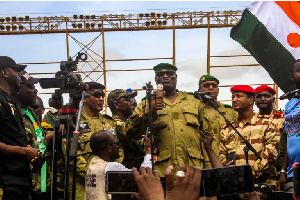Niger’s military government has rejected the latest diplomatic mission from African countries aimed at restoring constitutional order after a July 26 coup, resisting pressure from the United States and United Nations to come to the negotiating table.
The African Union (AU) planned to send a joint mission with representatives of the UN and the West African bloc ECOWAS to Niger on Tuesday, but it was denied permission by the military government, which has closed Niger’s airspace, the French magazine Jeune Afrique reported.
Leaders of ECOWAS, or the Economic Community of West African States, are preparing for a summit on Thursday to discuss their standoff with Niger’s coup generals, who defied a Sunday deadline to reinstate overthrown President Mohamed Bazoum.
The possibility of military intervention will be discussed, but ECOWAS has said it is a last resort.
An AU spokesperson confirmed to the Reuters news agency that a mission had been denied access while ECOWAS declined to comment.
The coup leaders had already snubbed meetings with a senior US envoy and another ECOWAS delegation that tried to negotiate.
Under Bazoum, Niger was relatively successful in containing an armed uprising devastating the Sahel region. It was also an important ally for the West after two of its neighbours rejected former colonial power France as an ally and turned towards Russia instead.
Niger is the world’s seventh largest producer of uranium, the most widely used fuel for nuclear energy, adding to its strategic importance.
“There’s no doubt that diplomacy is the best way to resolve this situation,” US Secretary of State Antony Blinken told French radio station RFI on Tuesday.
He said the United States was backing ECOWAS’s efforts to restore order. He declined to comment on the future of 1,100 US soldiers in Niger, where French, German and Italian troops are also stationed.
The UN said Secretary-General Antonio Guterres strongly supported mediation efforts by ECOWAS.
ECOWAS defence chiefs agreed on Friday on a possible military action plan, which their heads of state are expected to weigh up at their summit in the Nigerian capital, Abuja.
Sanctions imposed
The West African bloc has imposed sanctions on Niger, and its Western allies have suspended aid.
US Acting Deputy Secretary of State Victoria Nuland flew to Niamey on Monday but was denied permission to meet with coup leader Abdourahamane Tchiani or with Bazoum, who is in detention.
Instead, she spoke for two hours with other army officers.
“These conversations were extremely frank and at times quite difficult because, again, we’re pushing for a negotiated solution. … They are quite firm in their view of how they want to proceed, and it does not comport with the Constitution of Niger,” Nuland told reporters.
Last week, ECOWAS sent a mission to Niamey led by Abdulsalami Abubakar, a former military ruler of Nigeria, but Tchiani also refused to see him.
In contrast, Tchiani met on Monday with a joint delegation from Mali and Burkina Faso, neighbouring countries where the military has also seized power from civilian governments. The two military administrations have pledged support for the coup in Niger.
“We will not accept military intervention in Niger. Our survival depends on it,” Abdoulaye Maiga, a spokesman for Mali’s military government, said in an appearance on Niger state television.
Western allies fear that Niger could go the way of Mali, which threw out French troops and UN peacekeepers and invited in mercenaries from Russia’s Wagner Group after a military government took control in 2021.
Alongside the Malian army, fighters presumed to be from Wagner have carried out a brutal military offensive, executing hundreds of civilians last year, witnesses and rights groups say. The army and Wagner deny the charges.
Source: aljazeera.com
 Home Of Ghana News Ghana News, Entertainment And More
Home Of Ghana News Ghana News, Entertainment And More





